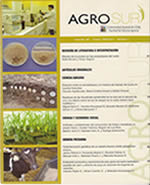Cambios en los contenidos de metales pesados (arsénico, cadmio y mercurio) en productos pesqueros durante los procesos de cocción
Contenido principal del artículo
Resumen
El propósito de este estudio fue determinar los efectos de los procesos de cocción sobre los contenidos de arsénico, cadmio y mercurio en algunos productos pesqueros hervidos y horneados. Pescados, como jurel (Trachurus murphyi Nichols, 1920) y congrio negro (Genypterus maculatus Tschudi, 1846), además de mariscos, como almeja (Prototha cathaca Molina, 1782), chorito común (Mytilus chilensis Hupé 1854) y cholga (Aulacomya atra Molina, 1782) fueron elegidos para el estudio. Se observó que ambos procesos de cocción tuvieron una reducción significativa en la concentración de arsénico en tres de las cinco muestras frescas; en el chorito común y el congrio negro, la concentración de arsénico no varió significativamente (p < 0,05). De forma similar, hubo también una reducción del contenido de cadmio en tres de las cinco muestras analizadas y la variación de concentración de cadmio no era significativa en el chorito común y en la almeja. En cuanto al mercurio, se observó que no hubo diferencias significativas de concentraciones entre los productos frescos y cocidos, lo que indicó un riesgo particular a la salud humana, debido a la formación del metil mercurio que no se solubiliza durante la cocción. Se encontró que tanto el proceso de horneado como de hervido tiene un efecto significativo sobre el contenido de metales pesados en los productos pesqueros, sin embargo, la magnitud de la reducción dependerá del producto y del metal pesado analizado.

